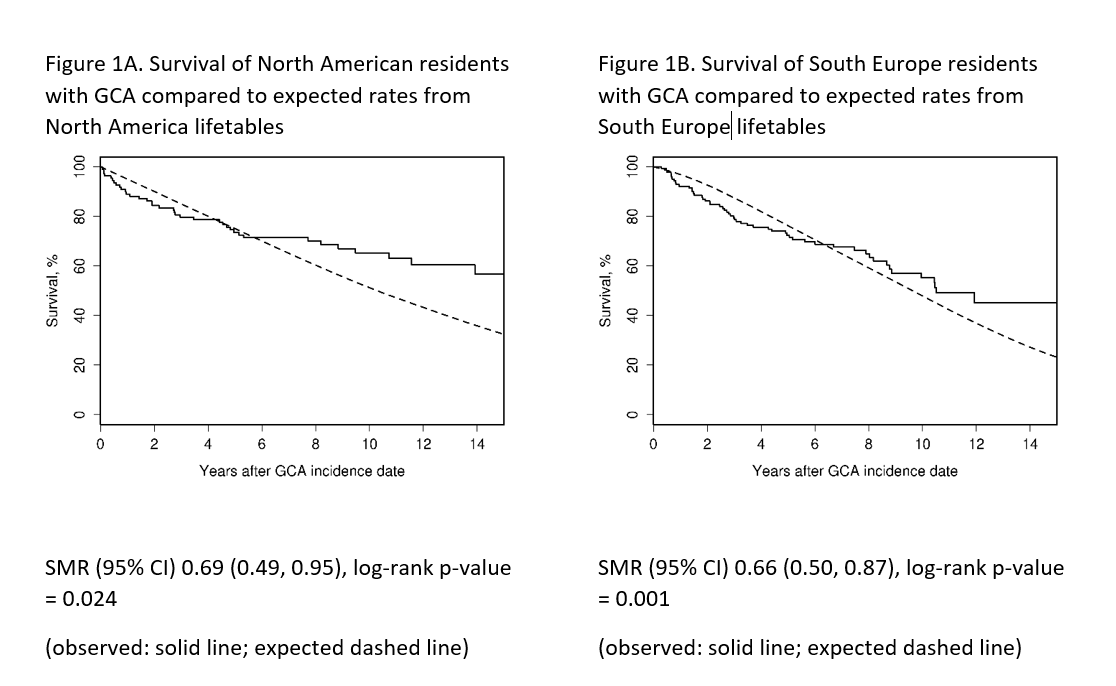Session Information
Date: Tuesday, November 12, 2019
Title: Vasculitis – Non-ANCA-Associated & Related Disorders Poster III: Giant Cell Arteritis
Session Type: Poster Session (Tuesday)
Session Time: 9:00AM-11:00AM
Background/Purpose: To compare clinical characteristics, treatment, long-term follow-up and prognosis of two population-based cohorts of patients with biopsy-proven giant cell arteritis (GCA) from North America (American cohort) and South Europe (European cohort).
Methods: All patients residing in these two geographic regions with a new diagnosis of biopsy-proven GCA in 1986-2007 were retrospectively identified. Patients were followed from GCA diagnosis to death, migration or September 2011. Comparisons were performed using Chi-square and rank sum tests, Kaplan-Meier methods and Cox models. To account for differences in general population survival between the 2 geographic regions, survival in each GCA cohort was compared to expected rates obtained from age-, sex- and calendar year-specific lifetable rates for the general population of its region.
Results: The study included 110 patients in the American and 144 in the European cohort. Compared with the American cohort, patients from the European cohort were younger (mean±SD age 74.6±7.4 years vs 77.8±7.6, p=0.002), had longer duration of symptoms prior to diagnosis (median [IQR] 1.4 [1.0, 2.7] months vs 0.7 [0.2, 1.3], p< 0.001) and were more likely to have cranial symptoms (93% vs 86%, p=0.048), partial or complete unilateral or bilateral permanent vision loss (21% vs 6%, p=0.001), systemic symptoms (67% vs 46%, p=0.001) and polymyalgia rheumatica at or before GCA diagnosis (47% vs 26%, p< 0.001). ESR and CRP were higher (mean 88±29 mm/h vs 73±77, p< 0.001 and mean 89.0±60.2 mg/L vs 35.2±43.4, p< 0.001 respectively) and hemoglobin lower (mean 11.2±1.4 g/dl vs 11.8±1.4, p=0.004) in European than in the American cohort. Patients from the American cohort received a higher initial prednisone dose (mean 53.6±15.3 mg/day vs 49.5±12.8, p=0.001). There were no differences in relapse rates, cumulative glucocorticoid (GC) dosages at 1, 2 and 5 years, and time to first GC discontinuation.
Overall survival curves showed a better survival of patients with GCA from both study cohorts compared to expected rates obtained from age-, sex- and calendar year-specific lifetable rates for the general population of the respective regions (Figure 1A-B). As shown by survival curves, the mortality of patients with GCA was similar to the general population in the first 6 years from GCA diagnosis (SMR [95% CI] 1.07 [0.72, 1.53], log-rank p-value = 0.71 for the American cohort, and 0.91 [0.65, 1.24], log-rank p-value = 0.55 for the European cohort), but became significantly lower in both study cohorts after 6 years from GCA diagnosis (SMR [95% CI] 0.27 [0.11, 0.57], log-rank p-value < 0.001 for the American cohort, and 0.36 [0.19, 0.61], log-rank p-value < 0.001 for the European cohort). The most common cause of death was heart diseases in both the study cohorts, followed by cancer, pulmonary diseases, infection and stroke.
Conclusion: The clinical features at onset of GCA differ between patients from South Europe and North America. Geographical, genetic and/or environmental factors may contribute to the differences observed in this study. Improvement in survival for the GCA cohorts is a novel finding that will require further validation.
To cite this abstract in AMA style:
Muratore F, Crowson C, Boiardi L, Pinelli A, Koster M, Restuccia G, Kermani T, Matteson E, Salvarani C, Warrington K. Comparison of Biopsy Proven Giant Cell Arteritis in North America and South Europe: A Population-Based Study [abstract]. Arthritis Rheumatol. 2019; 71 (suppl 10). https://acrabstracts.org/abstract/comparison-of-biopsy-proven-giant-cell-arteritis-in-north-america-and-south-europe-a-population-based-study/. Accessed .« Back to 2019 ACR/ARP Annual Meeting
ACR Meeting Abstracts - https://acrabstracts.org/abstract/comparison-of-biopsy-proven-giant-cell-arteritis-in-north-america-and-south-europe-a-population-based-study/

